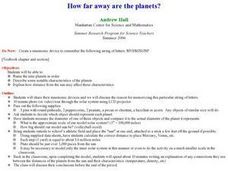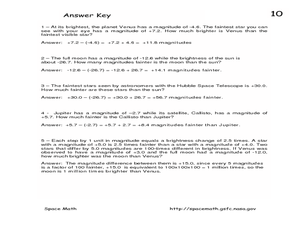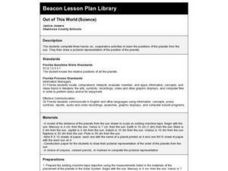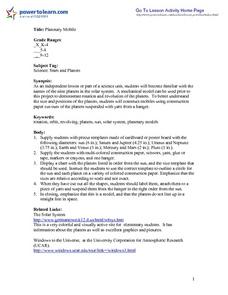PBS
The Planets of the Solar System
Launch a lesson that's sure to capture middle schoolers' interest! Exploration enthusiasts examine the planets of our solar system using an activity from PBS's Space series. The resource includes images and information for each planet,...
University of Colorado
Looking Inside Planets
Researchers use scientific data to understand what is inside each of the planets. The first in a series of six, this instructional activity builds off of that concept by having pupils use a data table to create their own scale models of...
University of Colorado
Looking Inside Planets
All of the gas giant's atmospheres consist of hydrogen and helium, the same gases that make up all stars. The third in a series of 22, the activity challenges pupils to make scale models of the interiors of planets in order to...
Star Date
Astronomy Day from McDonald Observatory Solar System Scale Activity
Add a visual aid to your solar system lessons. Enthusiastic astronomers create a model depicting the nine planets and their distance from the sun.
Star Date
Solar System Scale Model Demonstration
Explore outer space and decorate your classroom with an astronomy project. Learners create a visual model with the creation of a scaled solar system using different sized balls.
NASA
Solar System Scale & Size
Use a variety of whole fruits to represent the different planets in the solar system to introduce scale sizes to your math or space science class. They follow suit by creating a non-scaled model of the solar system using specific-colored...
Curated OER
Planet Fractions and Scales
In this planets and fractions worksheet, students solve nine problems about the sizes and scales of planets compared to each other using fractions.
Virginia Department of Education
Solar System Model
How many planets can you name? Did you get all 13 in our solar system, including the dwarf planets, or were you surprised when you read there are 13 planets? The instructional activity helps scholars understand the scale of the universe...
Curated OER
A Model Solar System
If Earth is modeled by a grapefruit, what planet could be represented by a golf ball? This activity uses everyday and not-so-everyday objects to create a model of the Solar System.
Curated OER
How Far Away Are the Planets?
Young scholars name nine planets in order, describe some notable characteristics of the planets, explain how distance from the sun may affect these characteristics, and create solar system models.
Curated OER
The Stellar Magnitude Scale
In this stellar magnitude scale worksheet, learners use a scale showing the magnitude of objects in the sky to answer 5 questions about the brightness of the moon, the planets and stars.
Center for Math and Science Education
Pocket Solar System
How in the world can something as big as the solar system possibly fit in your pocket? Complete this simple modeling activity and find out, as young scientists gain an appreciation for the incredible scale of outer space.
Center for Math and Science Education
Solar System Launch
Trying to understand the vastness of outer space can be quite a challenge for young scientists. Help put things in perspective with this cross-curricular activity as students work in pairs creating scaled models of the solar system,...
Curated OER
The Solar System
High schoolers construct a sketch of the planets in our solar system using concentric circles and angles. In this solar system lesson plan, students plot the position of each planet on concentric circles using graph paper. The sun is...
Curated OER
Modeling the Solar System
Students build a scaled model of the solar system. In this space science lesson, students arrange them according to their distances from the sun. They analyze each planet's unique features such as density and relative gravity.
Community Consolidated Schools District 168
Solar System Model Project
Challenge young astronomers to demonstrate their knowledge of the solar system with this fun open-ended science project. Provided with a short list of requirements, students are given the freedom to use their creativity and whatever...
Voyage Solar System
Round and Round We Go — Exploring Orbits in the Solar System
Math and science come together in this cross-curricular astronomy lesson plan on planetary motion. Starting off with a hands-on activity that engages the class in exploring the geometry of circles and ellipses, this lesson plan then...
Curated OER
The Outer Planets
In this planets worksheet, students research the diameters and sizes of the planets. Then student will create scale model sizes of the planets out of cookie dough. Students complete 5 short answer questions.
Curated OER
Solar System Hall Model
Not novel, but fun, this activity gets your space science learners to model the size of the planets and the solar system along your school's hallway. Scaled measurements as well as actual distances are provided for both planet diameters...
Curated OER
Out of This World (Science)
Students participate in various hands-on activities to visually demonstrate the positions of the planets from the sun. Then they draw a pictorial representation of the order of planets from the sun.
Curated OER
Spaced Out
Students explore the transit of Venus and the information that this minieclipse provides about the distance between the Earth and the sun. They create their own astronomical units.
Curated OER
Hopping Across the Solar System
Young scholars role-play and communicate that objects in space have describable properties, locations, and movements. Students identify and communicate effectively that Earth is the third planet from the Sun in the solar system, eight...
Curated OER
Planetary Mobile
Students receive pre-cut templates of cardboard with appropriate diameters of each planet and the sun. They use multi-colored construction paper, scissors, yarn, and other art supplies to create their own models of planets. When students...
Curated OER
Our Place in Space
Third graders identify the different planets that make up the solar system. In this space science lesson, 3rd graders construct a scale model of the major planets. They explore their different unique features and dress up as planets.

























